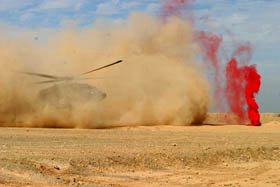U.S. personnel strategy in Iraq raising questionsTroop rotations and unit sizes are called detrimental to the war effort
By JOSEPH GALLOWAYKnight Ridder Tribune News
TAL AFAR, IRAQ - The mayor of this city in western Iraq is unhappy that his friends in the U.S. Army's 3rd Armored Cavalry Regiment are going home soon, and he's written to President Bush and Gen. George Casey, the top U.S. commander in Iraq, begging them to extend the regiment's tour of duty until it's finished pacifying Tal Afar.
The mayor, Najim Abadullah al Jibouri, is a Sunni Muslim Arab and a former officer in Saddam Hussein's army who's not from Tal Afar.
The provincial police chief in Mosul last summer appointed him a brigadier general to replace the local police chief, a Shiite who was turning a blind eye to police commando units that were causing suspected insurgents, all Sunnis, to disappear. Terrorists had blown up the police stations and driven out most of the policemen who weren't killed. On a U.S. recommendation, he was later promoted to mayor.
Since then, al Jibouri has worked hand in glove with Col. H.R. McMaster, the commander of the 3rd ACR, and Lt. Col. Christopher Hickey, who commands Sabre Squadron, which is based inside Tal Afar. The mayor doesn't want them to leave when their yearlong deployment is over in March.
The regiment's success and the mayor's concern about its departure raise two important questions about America's strategy in Iraq:
The first is whether the American practice of rotating troops in and out of Iraq — typically one-year tours of duty for soldiers and seven months for Marines — may be undermining the fight against Iraq's insurgency.
Limiting tours as the United States did in Vietnam helps relieve stress, support families and maintain morale. It also means that soldiers and Marines who are new to an area have to learn all over again what their predecessors discovered, often the hard way. And it disrupts personal relationships, such as the one al Jibouri has developed with McMaster and Hickey, which are indispensable in Iraq.
Over cups of hot, sweet tea, al Jibouri slyly jabbed at McMaster, a Philadelphia native who commanded a tank company in the 2nd Armored Cavalry in the Gulf War, and Hickey, an Army brat who was born at Fort Bliss, Texas, but grew up everywhere. "For you to leave is like a surgeon leaving in the middle of an operation," he said.
"We don't doubt there are many fine officers in the American army," the mayor explained. "But during these months, Colonel Hickey and I have created a relationship where I know what he will say even before he says it, and he knows what I will say. We have been through hard times together to forge these bonds. You should finish the job and then you can move on. "
The second question is whether the United States has sent enough troops to Iraq to duplicate the 3rd ACR's success in Tal Afar in bigger cities and nationwide. Al Jibouri said the American cavalrymen in Tal Afar had conducted "the best operation in Iraq, with none of the big destruction like in Fallujah."
Tal Afar has some 250,000 people, and the city is relatively remote and self-contained. The 3rd ACR, which has some 4,700 troops, walled off the city and cleared out terrorists and insurgents block by block.
Lt. Gen. David H. Petraeus, who commanded the Army's 101st Airborne Division, was given high marks for rebuilding the Mosul area after the 2003 invasion, but community relations soured when his division left and was replaced with a much smaller brigade.
And while violence is way down in Tal Afar compared with last summer, there are only faint signs of reconciliation between the city's competing ethnic groups.
Order is enforced by outsiders with a heavy military hand.
McMaster and his troops arrived last summer after Tal Afar suffered 140 terrorist attacks in June.
Then the Americans, the mayor, a new chief of police and an emboldened Iraqi army division began the long, hard work of pacifying the city and restoring some semblance of law and order.
Note from Pa -- I ran across this news item scanning for information on the 3rd ACR this morning. While the Tall Afar mayor has legitimate respect for Col. McMaster, LTC. Hickey and the soldier's of the 3rd ACR, extending the tour of our sons and daughters certainly won't hasten the end to terrorism. It won't do much to maintain moral, relieve stress, or increase family support either. Think about it. "Ain't gonna happen"
Two To Keep An Eye On
6 years ago





1 comment:
You've got that right, thanks but no thanks, I want my boy home! The relief is on the way and they're good, just not Cav.
Post a Comment